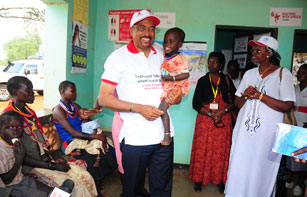
Feature Story
The First Lady of Uganda rolls out next phase of campaign to stop new HIV infections among children
17 September 2013
17 September 2013 17 September 2013
UNAIDS Executive Director and First Lady of Uganda met with mothers at a health centre in Nadunget, Uganda, 16 September 2013. Credit: UNAIDS
The First Lady of Uganda, Janet K Museveni, showed her commitment to stopping new HIV infections in children by bringing a national campaign to Karamoja, one of the most disadvantaged regions of her country. She launched the Elimination of Mother-to-Child- Transmission of HIV (eMTCT) Campaign in Moroto, a city in the north eastern region on 16 September.
The campaign is part of the government’s push to prevent new HIV infections among children by promoting an antiretroviral therapy (ART) regimen where all pregnant women living with HIV are provided ART for life. This is consistent with the 2013 World Health Organization guidelines which recommend that ART be initiated in certain populations including pregnant and breast-feeding women in resource limited settings.
Speaking at the launch, the First Lady who is also the Cabinet Minister for Karamoja Affairs said “Sadly, 65 babies are born with HIV every day in Uganda. We must give appropriate, life-saving messages if we are going to reverse this trend.”
The Minister of Health of Uganda, the UNAIDS Executive Director and other high-level dignitaries attended the launch. Uganda was recognized as a leader in Africa’s HIV response and was one of the first four developing countries in the world to provide people living with HIV with access to life-saving treatment. But in recent years, the country’s HIV response has lost some momentum. According to government figures, an estimated 140 000 new HIV infections occurred in 2012, compared to 120 000 in 2005.
There are signs Uganda is revitalizing its AIDS response. New infections among children declined from 27 000 in 2009 to 15 000 in 2012—a 49% drop. The number of women accessing prevention of mother-to-child-transmission of HIV (PMTCT) services in the country also increased rapidly from 45% in 2011 to 73% 2012.
UNAIDS Executive Director Michel Sidibé applauded the First Lady for her personal commitment to bringing HIV treatment and care services to women in poor and marginalized communities.
“Uganda brought hope to millions of people. It showed the word that AIDS can be overcome and Africans can have access to treatment. This hope was built on courage, strong leadership and partnership,” said Mr Sidibé. “Uganda needs to bring back the courage and commitment of its early days to finish the job and have a generation born free from HIV.”
The First Lady and Mr Sidibé met with two couples, who shared their experience as parents living with HIV. “Thanks to the treatment and advice I got from the health centre I gave birth to a baby born HIV free. That baby is now two years old.” said Angella Nate, who has been living with HIV for the past last six years. “I tell everyone my story because I want all mothers to see their children grow up healthy and get the same chance in life as everybody else.”
The UNAIDS Executive Director will continue with his official visit to Uganda on 17 September, meeting with civil society groups, district level government leaders and the country’s president.
Related
 “Who will protect our young people?”
“Who will protect our young people?”

02 June 2025
 Impact of US funding cuts on HIV programmes in Uganda
Impact of US funding cuts on HIV programmes in Uganda

19 March 2025

